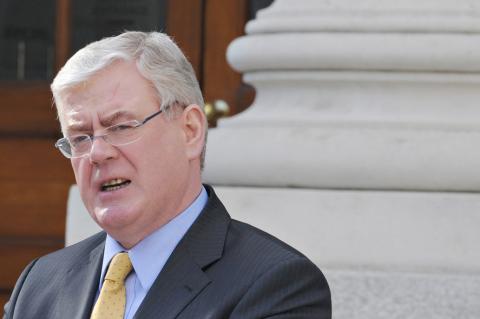Labour in government: Making inequality worse

Ireland is still a very rich society - the problem is not how poor we are but how badly we distribute those riches. By Vincent Browne.
The Labour Party is right. Had Fine Gael got an overall majority in the 2011 election, last week’s budget would be much more unfair. Social welfare rates would be cut again, having been cut in the first Fine Gael budget of last year; child benefit would no longer be a universal payment; there would be no mansion charge, the cuts in health and education would be deeper.
So there is a point to Labour being in Government and the same is true of Labour’s role in the seven previous coalitions in which it participated – with Fine Gael in 1948-51, 1954-57, 1973-77, 1981-82, 1982-87, 1994-97 and with Fianna Fáil 1992-94.
But is that all Labour is about?
After its last period in government from 1992 to 1997, a devastating commentary on its record in office – the Institute of Public Health report on Inequalities in Mortalities, was published in 2002. It showed that, during the time Labour was in government then, so deep were the inequalities in this society there were 5,400 premature deaths every year because of these inequalities.
One might have thought such a devastating legacy of its previous participation in office would have caused Labour to reflect on the point of being in coalition, but only Liz McManus, now departed from politics, even commented on the Inequalities in Mortalities revelations.
Following last year’s budget, the first after Labour’s most recent return to government following the ravages of its previous period in office, the ESRI established that the 2012 budget’s combination of indirect tax increases and welfare cuts imposed greater percentage losses on those with low incomes (reductions of between 2 to 2.5%) as against losses of about 0.7% for those on the highest incomes.
That same ESRI study showed the previous Fianna Fáil-led government was much more progressive, with the impact of the austerity regime being directed most on those with higher incomes.
Did anybody in Labour wonder what was the point of being in government with Fine Gael if the outcome was an even more unequal and cruel society than pertained when the excoriated Fianna Fáil was in office?
And even in the Fianna Fáil era we find Ireland was one of the most unequal countries in Europe, as measured by the “at risk of poverty” rate. On Monday 3 December, Eurostat published its latest report on poverty and social exclusion. It showed that for the EU as a whole the at-risk-of-poverty rate was 24%, but for Ireland, it was almost 30%. Only three other countries in the EU 27 had a higher at-risk-of-poverty rate: Latvia, Lithuania and Romania.
And now Labour is part of a Government that is making that even worse.
It is not that the likes of Eamon Gilmore, Pat Rabbitte, Joan Burton and others are venal or have abandoned all principle for the status, income and the robust sense of importance that so often accompanies ministerial office – although possibly some of these factors apply. But that they are persuaded their participation in government makes a benign difference and, possibly (probably?) it does. And possibly, given the age profile of the Labour Ministers, that is the best they can aspire to now personally, or rather that that is how they see it.
They also seem convinced there is a patriotic duty to rescue the country from the devastation done to it by Fianna Fáil, without, it seems, at all reflecting on how they contributed handsomely to that devastation by urging Fianna Fáil to be even more excessive in the trajectory on which it was driving the nation. Remember Labour was first out of the traps in 2007 advocating tax cuts; they wanted to cut stamp duty, which would have inflated the property bubble even more?
And remember Labour went along with the bank guarantee and avoided voting for it only because of the inordinate discretion the implementing legislation gave the Minister for Finance and the failure of that legislation to impose limits on bankers’ pay.
They see Ireland as having turned some corner on the way to recovery for which they take credit, while all the relevant data shows quite the opposite is the case.
But, fundamentally, isn’t Labour supposed to be about changing the structure of wealth, income power and privilege in society? Isn’t that the purpose of the Labour Party, its foundational objective? How then does it never allude to the stark inequalities here, to the reality that we remain a very rich society and the problem is not how poor we are but how badly we distribute those riches?
Ireland remains one of the richest countries in the world. Excluding the oil sheikhdoms and the more brazen tax havens (Ireland has not quite risen to the brazen category yet), this is the 17th richest country in the world, according to the World Bank on a gross national income basis. We are just behind now France and Japan and ahead of most of our European partners, including Italy and Spain.
It is just that we can’t or won’t distribute those riches fairly and Labour in government makes it worse.
Image top: The Labour Party.
